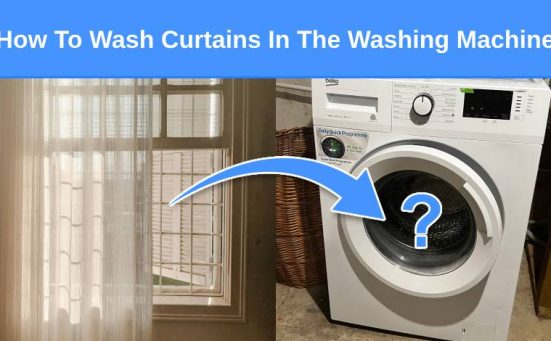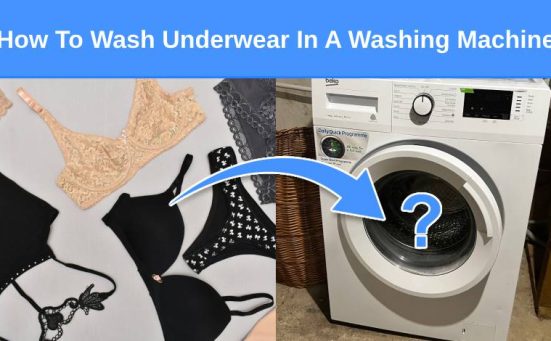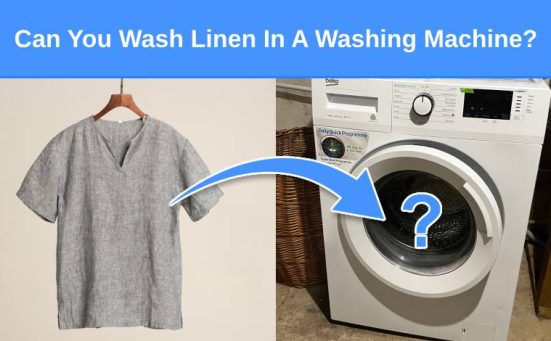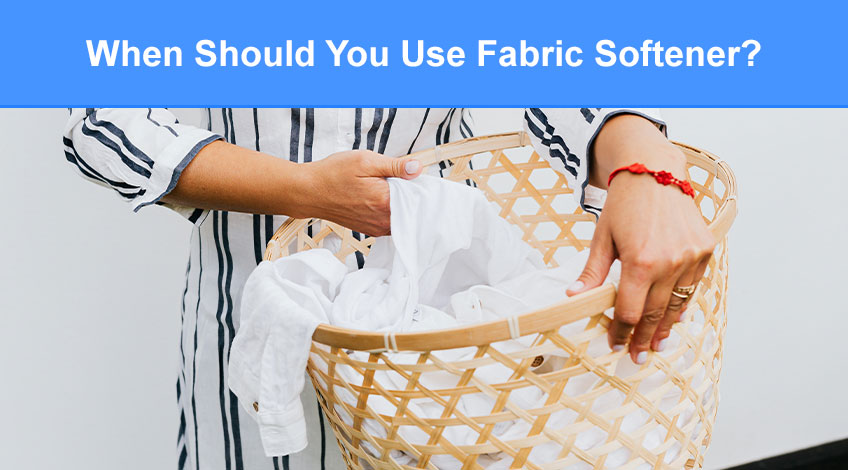
When Should You Use Fabric Softener? (& when shouldn’t you)
When most people think of fabric softener, they think about that large plastic container full of that sweet smelling liquid. And many of us reach for that bottle every time we use the washing machine, it’s just part of the whole wash day routine.
But have you ever questioned why you use fabric softener? Or whether it’s any good for all of your laundry? Or even when you should add fabric softener to your laundry?
If these are questions you’d like answered, keep reading.
What Is Fabric Softener?
Fabric softener is a popular product designed to soften our clothes as well as reduce static and creases whilst leaving them smelling fresh. There are two main forms of fabric softener which are;
- Liquid Fabric Softener
- Dryer Sheets
Liquid Fabric Softener
Liquid fabric softener comes in containers which typically have a lid that doubles as a measuring cup. This allows you to add the correct amount of softener to the softener dispenser depending on the size load you’re washing.
There are also fabric softener pods available that take the guesswork out of dosing by having the correct amount in each pod.
Dryer Sheets
Dryer sheets are designed to be used in the tumble dryer and are made from non-woven plastic sheets that have fabric softener impregnated into them. The sheets release the fabric softener once a certain temperature is reached in the dryer.
Whether you use liquid fabric softener or dryer sheets you will be using the same, or very similar chemicals to soften your clothes.
Where Should You Put Fabric Softener?
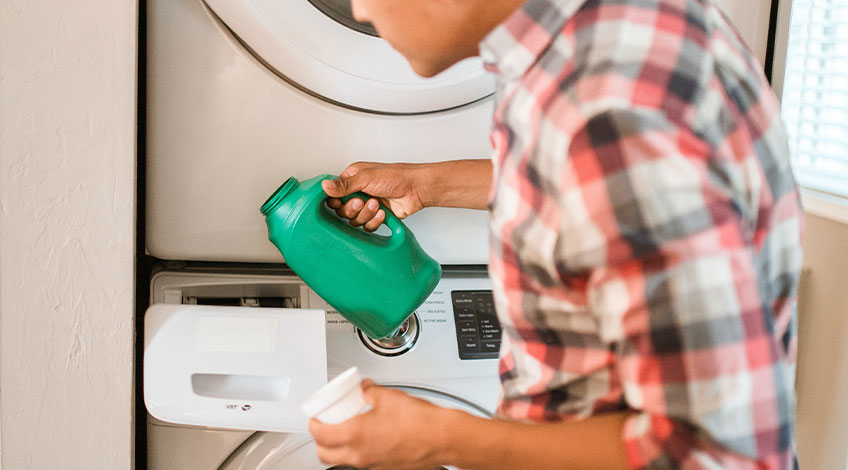
Where you put the fabric softener depends on the type you’re using and whether you own a front loader or a top loader.
In most cases the symbol for fabric softener is a flower but there are some variations so it’s best to consult your user manual if you’re unsure.
Front Loader Washing Machines (common in UK)
For front loaders, you should pour the correct amount of fabric softener into the dispenser marked with a flower symbol before starting the wash cycle. The machine will dispense the softener as and when needed.
Top Loader Washing machines (common in USA & Canada)
On top loaders, you should pour the correct amount of softener into the dispenser with the flower symbol that is usually located on the central column. The machine will dispense the softener as and when it’s needed.
Hand Washing
Fabric softener can also be used when hand washing as long as the garments being washed can tolerate fabric softener. You will need to manually add it when needed which will be after you have washed the clothes.
You should mix 1 tablespoon of fabric softener with 1 cup of water and add this solution to a full bowl of water. Allow the clothes to soak in this water for a few minutes before rinsing and drying as normal.
Tumble Dryers (dryer sheets)
Dryer sheets should be added to the tumble dryer along with the clothes to be dried. Once the cycle has completed remove the sheet and dispose of carefully be extra careful around pets.
Many dogs and cats find dryer sheets irresistible, however the chemicals present can be harmful to pets, animals in general and people (see below).
Please Note: You should never pour undiluted fabric softener directly onto clothes as this is likely to damage them.
Why Are Some People Against The Use Of Fabric Softeners?
Fabric softeners have received a lot of bad press in recent years, and for good reason. You see, fabric softeners are made from multiple chemical compounds that are known to be linked with many health problems.
Health Issues Linked With Fabric Softeners
The problems all stem from some of the more commonly used chemicals found in many fabric softeners. These include some that have been linked with breathing issues, eye problems, skin irritations, and in some cases even cancers. Chemicals like;
- Hexylene Glycol
There are links with skin allergies, eye irritations and breathing problems with hexylene glycol and it is one of the main irritants associated with fabric softeners. - Glutaraldehyde
Also known as glutaral, this chemical has been associated with many skin allergies as well as asthma. - Ethanol
Ethanol has been associated with disorders affecting the central nervous system. - Benzyl Acetate
There have been some findings that link benzyl acetate and pancreatic cancer. - Benzyl Alcohol
This has been associated with many respiratory problems including coughs, breathing issues and asthma.
As if this wasn’t bad enough, the chemical compounds used to reduce static in fabric softeners, quaternary ammonium compounds also known as quats have also been linked with some pretty nasty conditions including;
- Skin Allergies
- Respiratory Issues (including Asthma)
- Anaphylactic Reactions
- Reproductive Issues
Environmental Issues
Many of those same chemicals are non biodegradable which means they stick around for many years. Which is unfortunate for our aquatic life. Because all residual fabric softeners get washed down the drain with the rest of our waste water.
Which then releases these chemicals into our rivers and eventually our seas. This leads to harmful chemicals affecting our fish, invertebrates, plants and algae.
With the knock on effect for any birds or animals that use those waterways for food, drink etc.
What Clothes Should You Use Fabric Softener On?
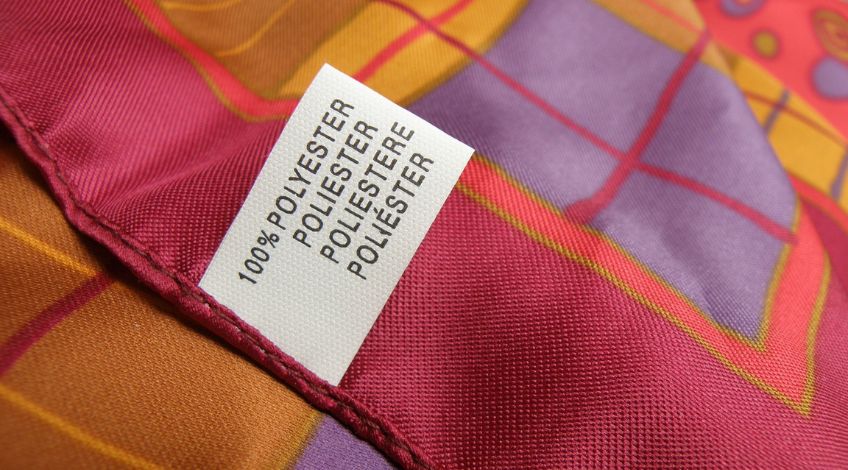
After reading all of the detrimental effects that fabric softeners can have on people, plants, animals, birds and fish, you might be wondering is it worth using it? We highly recommend abstaining from using fabric softener whenever possible.
However for those of you that still want to take a chance, there are many types of laundry that you can safely use fabric softener on. As long as you don’t use it in every wash.
This is because of the other thing about fabric softeners, they work by coating the fibres of the clothes being washed. The way fabric softeners work is by coating the fibres of the materials in the wash.
This smoothes the fibres out making them less likely to catch on the fibres of other fabrics as they pass in the drum. The coatings used are silicone oil-based and this builds up on the fibres over time.
The problem with silicone oils is they make the fabrics they coat waterproof. Which means that over time, wash after wash, the fabrics lose their ability to soak up water.
Now, for fabrics to get clean, they need to absorb water to loosen the dirt, sweat and bacteria. Which is then washed away during the wash and rinse cycle.
If the fabric can no longer absorb water, it cannot get clean. This leaves many clothes and other items dirty and smelly as well as full of germs and bacteria after being washed.
What Can You Use It On?
There are several popular synthetic fabrics used to make clothes and many of them can be treated with fabric softeners. Synthetic fabrics don’t absorb moisture too well anyway so that’s not an issue generally.
However, if you use too much fabric softener, it is likely to stain the item as it’s often made from a synthetic fabric, which will leave streaks that are difficult to remove.
Also cotton items can be treated with fabric softener as long as it’s not in every wash. This is because the cotton fibres can get coated in softener which over time will lead to the fabric losing its ability to absorb water, which means it won’t get clean in the wash.
What Items Should Not Be Treated With Fabric Softener?
The first thing to say here is that if you have any doubts, however small, about using fabric softener on any items at all, don’t use it. It’s always better to be safe than sorry.
It’s going to be easier to list the items that shouldn’t be treated with fabric softener which include;
Towels
Once fabric softeners get coated onto the fibres of a towel, it can longer absorb moisture. Which kind of makes a towel useless.
Microfiber
Fabric softener should never be used when washing anything made from microfiber. The softener will clog up the minute pores of the fabric.
Underwear
With all of those harsh and potentially dangerous chemicals present in fabric softeners, would you knowingly let them get close to your skin in such a delicate area?
Bed Sheets
The majority of fabrics used to make bed sheets remain soft or get softer with use. This means there’s no need to use fabric softener on them.
Denim
This is a difficult one because there are reasons for and against using fabric softeners on denim. Denim is a pretty robust fabric and there are many that say denim jeans should hardly ever be washed.
If you subscribe to that school of thought, then using a small dose of fabric softener occasionally won’t be too bad. As long as you remember that a buildup will make it difficult to clean denim.
Sportswear Or Activewear
Sportswear or activewear as well as gym wear or any type of synthetic fabric that has the capability to wick moisture away will become damaged using fabric softener.
Wool
Wool has natural absorbency and should never be treated with fabric softener. To do so would make the wool garments difficult to clean and inhibit their ability to regulate temperature.
Baby Clothes
Baby clothes often come treated with a fire retardant which can be rendered useless by fabric softener. The fabric softener coats the treated fibres and dries on them and then recoats them every time fabric softener is used.
The problem is some of the chemicals in fabric softeners are flammable which will make the baby clothes more likely to catch fire than before they were treated with the fire retardant.
Added to which many babies have sensitive skin and you’ll be exposing them to those potentially harmful chemicals again.
Cotton
In many cases, it’s OK to use fabric softener on cotton items. However, due to the chemicals used and the way they build up on the individual fibres, fabric softeners will damage even cotton items over time.
Added to which the clothes will eventually lose their ability to absorb water which means they won’t get washed properly.
Pet Bedding
There can be serious and even life threatening complications if pets get exposed to the chemicals found in fabric softeners. There are pet friendly detergents which are safe to use to wash pets bedding but you should never use fabric softeners on pet bedding.
If you even suspect that your pet has been exposed to fabric softener or dryer sheets, you should contact your vet immediately.
Are There Any Eco-Friendly Fabric Softeners?
If you prefer to use a fabric softener even after everything we’ve just learned, there are a few eco-friendly products out there. Which include;
Tru Earth Eco-Strips Fabric Softener
- IN-WASH FABRIC SOFTENERS: Enjoy a happier, healthier, and cleaner home with the Tru Earth Fabric Softener Eco-Strips that give you the softest, clean laundry with reduced wrinkles. Add a pleasant scent with the Fresh Linen Scent Booster version
- NO MORE MESS: Tru Earth's fabric softener strips have also helped eliminate the unwanted mess from powders and liquid softener spills that leave a mess all over counters, cupboards, and floors. Comes in easy-to-use and easy-to-store packs of 32 strips
This product comes supplied in dose sized strips which are biodegradable, hypoallergenic, paraben-free, phosphate-free, and cruelty-free.
Miniml Eco Fabric Softener
- ✅ PLANT POWERED FABRIC CONDITIONER: Leaves your clothes soft, smelling great and static-free with an all natural fabric softener liquid detergent. Our naturally derived softening agents help protect fibres providing sensitive skin with ultimate comfort
- ✅ FRESH LINEN SCENT: Remove nasty odours and freshen up your clothes with our fresh linen fragrance. For best results, pour 20-50ml of our skin friendly eco fabric conditioner into your machine dispenser but not onto fabrics directly
This product is derived from plants and is all natural. It is designed to protect fibres and is hypoallergenic.
Eco-Mate Fabric Conditioner
- CONCENTRATED FABRIC CONDITIONER - Our 100% plant based fabric conditioner protects fibres and leaves laundry soft and static free, providing ultimate comfort for sensitive skin. This lavender softener has a sweet and calming scent, delicately fragranced with pure lavender essential oil. (Size: 500ml x 3, Scent: Lavender)
- EFFECTIVE & LONG LASTING - Concentrated for powerful & effective natural cleaning, our fabric conditioner provides an economical high quality wash with long-lasting freshness. The conditioner is ideal for washing bedding, towels, t-shirts, jeans, work & school uniforms and more!
This product is plant based, 100% biodegradable (including the packaging) and hypoallergenic too.
Are There Any Safe, Natural Alternatives To Fabric Softeners?
If you have decided that you don’t want to expose your family to any more harmful chemicals than is absolutely necessary, there are a few safe natural alternatives available which include;
Wool Dryer Balls
- 【Handmade & High-Quality 】- Made of 100% premium New Zealand wool. Completely handmade, and contains no fillers, no chemicals, or synthetics.
- 【Reusable】- These woolen balls can be used hundreds of times in the tumble dryer to speed up the drying process, remove lint and reduce static from the laundry load!
Instead of using dryer sheets in the tumble dryer, try using wool dryer balls. They are 100% natural, reduce drying time by ¼, reduce static and help prevent wrinkles too.
If you don’t have any wool dryer balls you can use clean tennis balls as long as you keep to a low or medium heat only. You can sprinkle a few drops of your favourite essential oils onto the balls to give your clothes a pleasant aroma.
Bicarbonate Of Soda
- ECO-FRIENDLY: Sodium Bicarbonate / Baking Soda is one of the top eco-friendly , safe and inexpensive cleaning, baking and household products available.
- CLEANING: Baking Soda is particularly useful in food preparation, cleaning surfaces, ovens, grills, microwaves and fridges whilst also deodorising and freshening without leaving any harsh chemical smells.
All you need to do is add ½ a cup of bicarbonate of soda to the wash cycle to soften both the water and your laundry.
White Vinegar
- PERFECT FOR COOKING - Use in vinaigrettes, sweet-and-sour dishes, marinades, pickles, chutneys, and butter sauces. Or infuse with fresh herbs to make flavoured vinegar. Whatever the occasion our Fresh White wine vinegar will be perfect.
- FABRIC SOFTENER - This white vinegar is perfect for households that have pets and children around as well as commercial premises where health and safety is of paramount importance
Adding ½ a cup of white vinegar to the rinse cycle will soften your clothes and remove any bad odours too.
Washing clothes that are suffering from an overdose of fabric softener in 1 cup of white vinegar will help to remove it.
SEE ALSO: How to Soften Hard Towels: Easy Solutions!
Frequently Asked Questions
With modern detergents, improved dyes and better wash cycles, it is no longer necessary to use fabric softener. Many people use fabric softener out of habit, not necessity.
You should add fabric softener before the wash commences and always put it in the correct dispenser which is usually the one with the flower symbol. The machine will automatically add the softener at the correct time in the wash cycle.
Regular use of fabric softener on towels will lead to the towels no longer being absorbent. This is because the fabric softener builds up on the fibres of the towel and prevents them from absorbing water.







